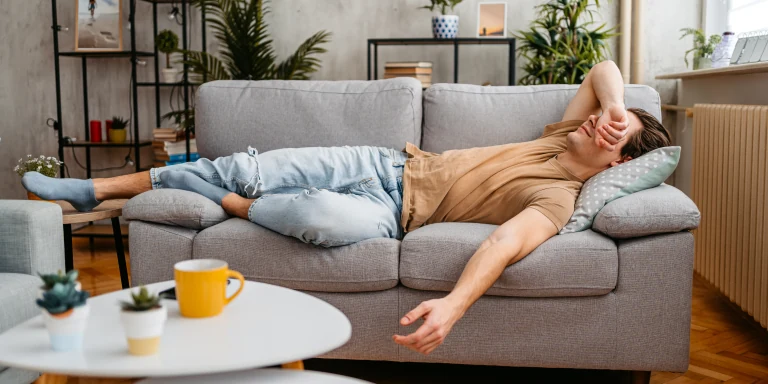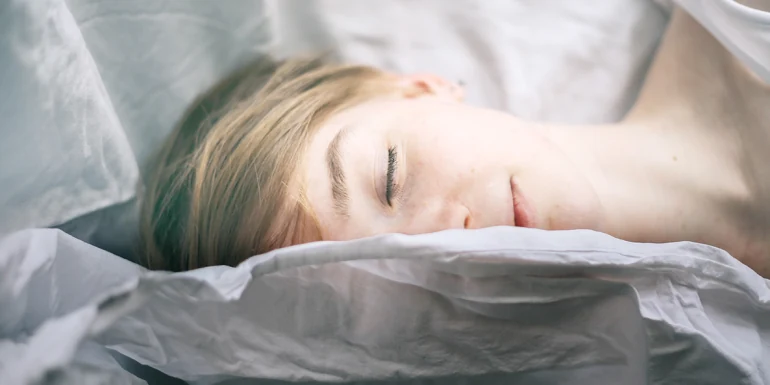
Sleep deprivation: the impact on physical and mental health
Just one sleepless night can affect your mood, concentration and performance. What sleep deprivation does to us and the impact it has on our mind and body.
There are few things more agonising than desperately needing to sleep but being unable to. But what is sleep deprivation? What causes it and what can help combat sleep deprivation? You can find the answers to these questions here – and hopefully a way out of the vicious cycle caused by a lack of sleep. After all, the short-term and long-term consequences of sleepless nights are significant and pose a risk to your health.
How can you tell if it’s sleep deprivation?
One in ten people in Switzerland do not count their sleep as restful. Experts class sleep deprivation as sleeping poorly at least three nights a week over a period of one month and suffering the consequences during the day. If that’s the case, you must consult your doctor.
Sleep deprivation: symptoms
While tiredness is one of the logical consequences of a lack of sleep, sensitivity to pain and eating disorders aren’t as obvious. The effects of sleep deprivation are diverse and manifest in different physical and mental symptoms. Signs of sleep deprivation include:
- Drowsiness and tiredness on waking
- Leaden tiredness that lasts the whole day
- Irritability and severe mood fluctuations
- Difficulties with concentration and performance
- Listlessness
- Increased feelings of hunger and eating disorders
- Enhanced sensitivity to pain
- Headaches/migraines
What triggers sleep deprivation?
What triggers sleep deprivation? There are various reasons why we can’t sleep. As well as a disrupted sleep cycle, a restless baby, worries, or the noisy building site next door can disturb sleep:
- Work situation
Working in shifts or at night can muddle up the body’s rhythm and lead to constant sleep deprivation. Or you might be dealing with a lot of stress at work and can’t switch off at night. - Stress and worry
Be it short-term overworking or burn-out: stressful situations can cause you to make a mountain out of a molehill at night. Your mind starts to race and stops you from sleeping. - Life situation
Enjoyable and unenjoyable events alike, like a divorce, the death of someone close to you, marriage or the birth of a child, can cause disruption to sleep too. - Environmental conditions
Factors like noise, light and temperature can affect your sleep and lead to sleep deprivation. - Lifestyle
The consequences of unhealthy decisions are two-fold at night: consuming alcohol, cigarettes or fatty foods has a major impact on sleep. This, combined with a lack of exercise, can be a root cause of a lack of sleep. - Medical causes
Depression, anxiety, pain and chronic illnesses can have a negative effect on sleep – and sleep deprivation can, in turn, cause these issues. - Hormonal changes
Women are more likely to be affected by sleep deprivation than men. For instance, many women suffer from a lack of sleep as a result of hormonal changes during menopause.
Often, it’s the case that, when the triggering events have disappeared, the sleeplessness has taken on a life of its own and persists. This is referred to as chronic sleep deprivation.
Does this sound familiar? You’ve checked your e-mails one last time before bed, sent a WhatsApp message or watched the latest videos on TikTok – before you know it, another hour has gone by. This is what specialists refer to as “bedtime procrastination”: you actively delay going to bed without good reason, in spite of being aware of the negative consequences of pushing back bedtime. What’s more, the blue light from the screen inhibits the important sleep hormone melatonin.
What are the consequences of sleep deprivation?
We need sleep to stay healthy. It is important for regenerating the mind and body. The long-term effects of chronic sleep deprivation should not be underestimated: a lack of sleep impairs key processes in the brain and makes us susceptible to lots of illnesses.
Weight gain
When we don’t get enough sleep, too little of the hormone leptin is released. Leptin stops feelings of hunger and breaks down calories. Instead, when we’re awake, more and more of the appetite-boosting hormone ghrelin is produced. We start to crave sweet and fatty foods despite the fact that the body has enough energy.
Diabetes/sugar metabolism
One potential effect of sleep deprivation is increased blood sugar levels. Studies have shown that, after a week with less than five hours’ sleep, levels can correspond to those of a diabetic.
High blood pressure
In healthy people, blood pressure drops by 10–20% at night. Research shows that sleep deprivation can increase stress hormone levels, causing blood pressure to increase to an unhealthy level. This is a dangerous side effect of sleep deprivation.
Cardiovascular issues
A Norwegian study conducted over eleven years with 54,000 participants showed that people who didn’t feel rested after sleep at least once a week developed heart failure three to four times more frequently – presumably due to the increase in stress hormones.
Concentration and impaired memory
The German Aerospace Center found that just four nights with only five hours’ sleep can lead to major losses in performance. The concentration and hand-eye coordination of its subjects corresponded to their performance with a blood alcohol level of 0.6 per mille.
Nodding off (microsleep)
One potentially very dangerous consequence of sleep deprivation is the risk of nodding off momentarily, known as microsleep. Those affected generally cannot explain the phenomenon. They only notice when they wake up again, confused. Nodding off like this is particularly dangerous while driving.
Migraines/headaches
Our sleep-wake cycle has a major influence on migraines and headaches. A team from the University of California, Berkeley discovered that sleep deprivation increases sensitivity to pain because the regions of the brain responsible for this are very active.
Sleep is a highly active state: while we drift off to dreamland night after night, crucial processes run their course within us. Insufficient sleep takes its toll in the long run. In the Ratgeber Sleep you will find tips on how to make sure sleeping disorders have as little chance as possible.
Sleep deprivation: impact on mental health
Sleep and mental health are closely linked. Sleep deprivation can quickly lead to fluctuations in mood, irritability, anxiety and depression. This is hardly surprising – it is not possible to process everything that has happened during the day, resulting in overstimulation of the mind and body.
At the same time, mental illnesses and the medications used to treat them can cause sleep deprivation too. Here, it is important to review the situation and work with medical specialists to find a solution. Get help. It’s worth your while.
What can you do about sleep deprivation?
Try not to lose hope if you’ve had another bad night’s sleep. There are various things you can do during the day, in the evening and at night:
Clarifying the cause of sleep deprivation
If you feel exhausted after waking up and this persists for an extended period of time, you must contact your doctor.
A break during the day
A short five- to fifteen-minute nap can help counter acute everyday tiredness. You don’t need to lie down for this power nap: naps while sitting down can have the same energising effect. Remember to set an alarm.
Get a daily dose of fresh air and light
Sunlight suppresses the release of the hormone melatonin, influencing the sleep-wake cycle. A walk in the fresh air can be restorative. It automatically makes you more awake during the day so you sleep better at night.
Add breathing exercises to your bedtime routine
Taking long deep breaths can help you relax your body. Make a habit of doing breathing exercises for a few minutes before going to bed at night.
Improve sleep quality
Stop putting the light on when you go to the toilet during the night: bright lights stop the body from releasing the hormone melatonin, which promotes sleep.
Don’t look at the clock at night: as soon as you work out how many hours you have left to sleep, you will feel doubly stressed. Instead, enjoy relaxing in bed and take comfort in the hours that you have already slept.
Sleep deprivation has many negative effects on our mind and body. It is important to recognise which symptoms point towards sleep deprivation and what the causes might be. If you are suffering from a sleep disorder, you should certainly consult a doctor and seek clarification about the potential causes. After all, getting sufficient sleep has a key impact on our health and well-being.
Relaxation course – covered by Helsana
COMPLETA supplementary insurance covers 75% of the costs of recognised health promotion courses, up to a maximum of CHF 200 per year. Find out what benefits are included.

The expert provided the editorial team with advice and input for this article. Julia Pieh (doctorate in pharmacy and toxicology, pharmacist, naturopath) works in the Helsana Health Consultation Service.


Newsletter
Find out more about current health issues every month and get all the information you need about our attractive offers from all Helsana Group companies * delivered by e-mail to read whenever it suits you. Our newsletter is free of charge and you can sign up here:
We did not receive your information. Please try again later.
* The Helsana Group comprises Helsana Insurance Company Ltd, Helsana Supplementary Insurances Ltd and Helsana Accidents Ltd.